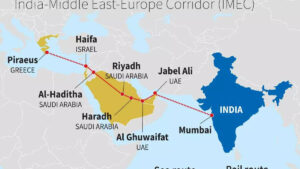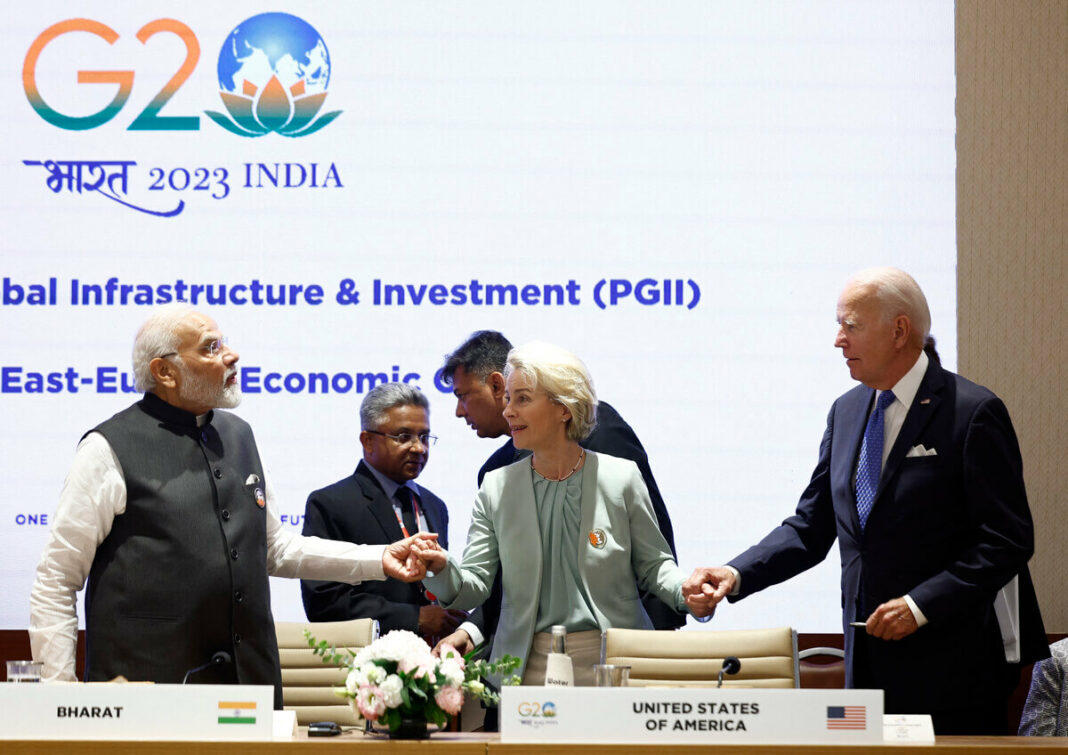Fatih Yurtsever*
At the G20 Leaders’ Summit on Sept. 9-10, leaders from the United States, India, Saudi Arabia, the United Arab Emirates, France, Germany, Italy and the European Union announced a memorandum of understanding (MoU) to develop the new India-Middle East-Europe Economic Corridor (IMEC). The project aims to connect the economic hubs of Europe and Asia, focusing on producing and exporting clean energy, laying underseacables, and connecting power grids and telecommunication lines to provide reliable access to electricity. The project also aims to encourage innovation in clean energy technologies and establish secure and resilient internet connections to connect communities.
IMEC will feature two distinct corridors: the Eastern Corridor, linking India to the Arabian Gulf, and the Northern Corridor, linking the Arabian Gulf to Europe. Upon completion, these corridors will include rail projects to establish a dependable and cost-efficient cross-border ship-to-rail transit network, complementing existing sea and road transport routes. This will facilitate the smooth transit of goods and services between India, the United Arab Emirates, Saudi Arabia, Jordan, Israel and Europe while enhancing regional trade, manufacturing, food security and supply chains. The participants are keen to attract new investments from partners, including the private sector, and create high-quality jobs. Turkey, which serves as a bridge between these continents, is not included in IMEC. Consequently, what are the geopolitical ramifications of Turkey’s exclusion from IMEC?

To fully grasp the geostrategic importance of the IMEC project, it’s essential to examine existing regional cooperation initiatives. These include the 3 Seas Initiative (3SI), Greece-Israel-Cyprus Cooperation in the Eastern Mediterranean and the India-Israel-United States-United Arab Emirates (I2U2) forum in economic and military domains. These initiatives were either implemented under the guidance of or with encouragement from the United States prior to IMEC. As a global power and the leader of the rules-based international system, the United States aims to establish regional partnerships that will restructure economic relations on a global scale. It aims to connect these regional partnerships to sustain the rules-based order. It also aims to counter China’s Belt and Road Initiative (BRI), which seeks to link Asia with Africa and Europe through land and maritime networks, promoting regional integration, increasing trade and spurring economic growth. Additionally, the United States aims to isolate actors that threaten the rules-based system, such as Russia and Iran. Countries such as Poland, Greece, Israel, the United Arab Emirates and India play a critical role in this strategy that the United States aims to implement.
The 3SI, also known as the Baltic, Adriatic and Black Sea Initiative, comprises 13 European Union member states in Central and Eastern Europe. These countries are situated along a north-south axis, stretching from the Baltic Sea to the Adriatic and Black seas. It seeks to strengthen economic ties, enhance energy infrastructure and promote cooperation in the transportation, energy and digital connectivity sectors. Greece became the 13th member of the initiative at the 2023 summit in the Romanian capital of Bucharest.
During the most recent meeting of the cooperation mechanism in the eastern Mediterranean among Israel, Cyprus and Greece, which was established with United States encouragement and support to promote military and economic cooperation, a decision was made to extend an invitation to India for future meetings to discuss collaboration, especially on natural gas exports. The invitation came after the visit of Indian Prime Minister Narendra Modi to Greece in August, marking the first time in 40 years that an Indian prime minister had visited the country. During his visit India and Greece agreed to enhance bilateral relations in the defense and security sectors, infrastructure, agriculture, education and technology.
The I2U2 forum is a collaborative partnership among the four countries, focusing on economic development, joint investments and new initiatives in various sectors such as water, energy, transportation, space, health and food security. The I2U2 group was formally established during a call by top US diplomat Antony Blinken to his Israeli, Emirati and Indian counterparts in October 2021. The I2U2 Business Forum, inaugurated in Abu Dhabi on Feb. 22, 2023, facilitates dialogue between governments and private sector representatives of the I2U2 group, promoting business cooperation opportunities. The forum is expected to transform into a security vehicle for the broader West Asia region, responding to major geopolitical shifts.
When considering the countries involved in the IMEC project as a whole, it becomes clear that the project’s goal is to connect forums and initiatives for regional cooperation established under the leadership of the United States. In essence, the IMEC project is a comprehensive effort towards this aim.
Turkey has been excluded from the regional integration projects mentioned above, including the IMEC project, due to the strained relations between Turkey and the United States. The exclusion of Turkey from IMEC is a significant setback for Turkey’s economy and its strategic ambitions. One of the issues that led to this deterioration was Turkey’s acquisition of the S-400 air defense system from Russia. Unfortunately, Turkey’s foreign policy under the administration of Turkish President Tayyip Erdoğan has been unpredictable, focusing on domestic political goals and a populist approach to foreign policy. This has led to losing trust in Turkey as a reliable partner in NATO and the United States. Turkey must take concrete steps to demonstrate its commitment to the rules-based international system to regain this trust. Failure to do so could result in long-term damage to Turkey’s economy and political status worldwide.
* Fatih Yurtsever is a former naval officer in the Turkish Armed Forces. He is using a pseudonym out of security concerns.

